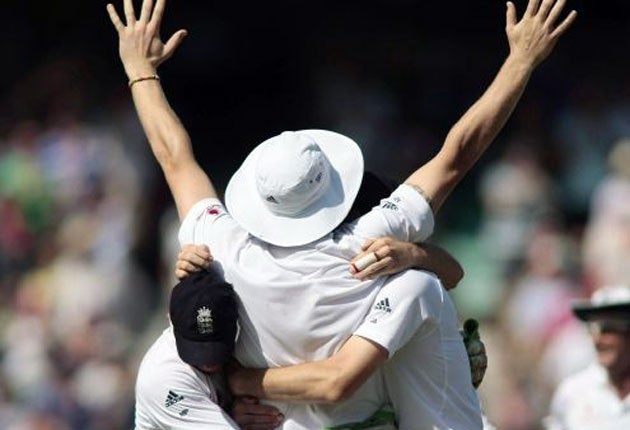Murdoch's Sky hit for six by threat of losing TV cricket rights
Pay-TV company may be barred from showing Ashes after government review

England's cricket authorities last night reacted furiously to proposals that they should no longer be able to sell television rights to the Ashes to the highest bidder.
The findings of a government review led by David Davies, the former executive director of the Football Association, into sport's listed events – the "crown jewels" – are published today and will recommend that home Ashes Tests be shown only on free-to-air television.
Any such move will also alarm BSkyB, who are beginning a £300m four-year deal for exclusive coverage of England's Test matches and have poured huge amounts into sport in this country in a successful bid to boost subscription.
This report will not affect the current cricket deal, but could have a dramatic influence on the future relationship between the Sky and the England and Wales Cricket Board, who sources said were "angry and deeply concerned" by the entire process. Other sporting bodies will be similarly affected.
The proposals are for one list of live sport that must be shown on non-subscription channels, with the secondary list of events that must be available as highlights being scrapped. England's home Test matches had been on the B-list after the ECB had lobbied hard for them to be downgraded a decade ago. That led to a lucrative partnership with Sky, but meant the sport was watched by far fewer viewers. Other sports that will be affected by Davies's report include football, with international qualifying games for the home nations to be added to the World Cup and European Championship finals as protected events, while the Epsom Derby and rugby league's Challenge Cup final may be removed from the list.
A number of sports' governing bodies are angry with the way in which the review has been carried out, that financial implications were not given due consideration and that there was no sports rights expert involved. Davies's eight-strong panel was staffed by a diverse collection of former sportsmen and women and broadcasters, including Eamonn Holmes and Dougie Donnelly, the face of BBC Scotland's football coverage. The brief is understood to have been narrow: should there be a list of protected events, and once they decided there should, which events "united the nation"? There have been claims of poor attendance by some of the panel.
"We are concerned over the lack of commitment shown by the panel in comparison with the chairman," said one leading sports administrator of his experience of the review. "If they have not bothered to turn up it looks as if they have made their mind up already."
It is estimated that moving the Ashes on to any new list would cost the sport upwards of £100m, while Gordon Smith, the chief executive of the Scottish Football Association, has described changing the status of the country's international qualifying games, currently shown on Sky, as "disastrous".
Any monies lost by the ECB, which is dependent on its broadcast deal for 80 per cent of its income, would have a direct effect on the funding of the game's grass roots, argue those opposed to the move, thereby negating any effect of increased participation off the back of larger viewing figures. It may lead to greater numbers but the facilities will not be there to support them. The ECB are to press for an independent economic study into the review.
When the Ashes were last shown on terrestrial TV in 2005, seven million watched on Channel 4. The equivalent figure for this summer's finale at The Oval, shown just on Sky, is two million. Also this summer nearly 12 million watched Andy Murray's engrossing late-night struggle with Stanislas Warwrinka in the fourth round of Wimbledon, a graphic demonstration of the superior reach of terrestrial TV and the BBC in particular.
The issue is further complicated by the analogue switch-off in 2012, which will mean more people receiving digital TV, and the rapidly changing nature of the broadcasting Representatives of the Derby had argued that there should be no list at all as it is an "anachronism in a multi-channel world". They regard being taken off the list as "good news".
But there is no good news for those running Scottish football. "If the revenue stream is not there then it's going to have a disastrous effect on the game," said Smith. "That's why we've gone with satellite. It's nothing to do with depriving supporters from seeing football. It seems like a great idea to say your games should be free-to-air. It sounds like you're really considering the public, but it would have serious financial implications."
The review is also clouded by the Government's escalating conflict with the Murdoch media empire, of which BSkyB is part. It has been described in some sectors as Brown's revenge. But Davies is an apolitical figure and a member of the panel stressed that the conclusions were reached with no outside interference.
A three-month period of consultation will follow before Ben Bradshaw, the culture secretary, and the sports minister, Gerry Sutcliffe, decide whether to adopt any of the reports findings. The Conservatives support the idea of a protected list for events of "true national resonance" and accept that it "comes at a cost, especially to cricket".
Subscribe to Independent Premium to bookmark this article
Want to bookmark your favourite articles and stories to read or reference later? Start your Independent Premium subscription today.

Join our commenting forum
Join thought-provoking conversations, follow other Independent readers and see their replies